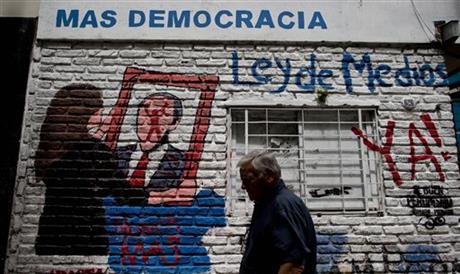
By MICHAEL WARREN
A man walks by a mural depicting Argentina’s President Cristina Fernandez, holding a frame over the image of a man with a Clarin newspaper logo on the face, with a message that reads in Spanish; “More democracy, Media Law now!,” in Buenos Aires , Argentina, Tuesday, Oct. 29, 2013. Argentina’s Supreme Court approved the country’s four-year-old broadcast media law on Tuesday, deciding that it’s constitutional to force private news media monopolies to break themselves apart if they exceed government-imposed audience limits. The historic ruling is a huge victory for Fernandez and a bitter defeat for Grupo Clarin, which has been a leading voice against her administration. (AP Photo/Natacha Pisarenko)BUENOS AIRES, Argentina (AP) — Argentina’s Supreme Court ruled Tuesday that the government has a responsibility to prevent media companies from growing so large that they dominate public discourse, upholding a law that could demolish the nation’s largest media group, a leading opponent of President Cristina Fernandez.
The approval of a 2009 law aiming to reshape Argentina’s broadcast media industry is a huge victory for the Fernandez government, which has campaigned for years to weaken Grupo Clarin. The group will now have to sell off many of the lucrative cable TV licenses that give it nationwide reach and provide the income to fund Clarin’s other properties.
“As ideas and information represent goods that are distributed through the media, if there is concentration, only some ideas or some information will reach the public, seriously harming public debate and the plurality of opinions,” the court said. “All of this demands the active protection of the State.”
Clarin is one of Latin America’s largest media companies, with interests in newspapers, magazines, a nationwide television network and broadcast TV and radio stations. The Buenos Aires stock exchange suspended trading in the company’s shares after they dropped nearly 6 percent due to the ruling.
Martin Sabbatella, appointed by Fernandez to run the new broadcast media regulation agency, called the ruling “a triumph of democracy.”
But Clarin says the law violates property rights, stifles anti-government voices and is self-defeating, because it imposes no limits on competitors that deliver news, internet access and other media services through telephone wires or by satellite to consumers nationwide.
The law was pushed through Congress by the Fernandez government with overwhelming support from other groups across the political spectrum, and replaces a hated dictatorship-era media law.
“It’s a fundamental step,” Sabatella said at a news conference, praising the court for recognizing that there were years of wide debate before the law passed Congress. “Unfortunately we had to wait four years for this because one group didn’t want to follow the law. Today we have the possibility applying it whole.”
The 392-page ruling also warned the government that it must act fairly to all media companies, and said many questions won’t be resolved until the law is implemented, presaging future legal battles.
The court’s majority warned that license holders must be compensated when forced to divest their stations, that subsidies currently going to pro-government media should be redistributed fairly and transparently, that state-owned media must be more than government mouthpieces, that the broadcast media regulator must be independent of executive power, and that any efforts to reform Argentina’s media industry must be done fairly and with due process.
“This law and its goal of achieving plurality and diversity in mass media would be senseless without the existence of transparent public policies in terms of official publicity,” the justices said.
When “the state affects freedom of expression, whether through subsidies, distributing official advertising or any other benefit, the communication media become mere instruments of support for a political movement, or a way to eliminate dissent and an open debate of ideas.”
The law says no TV network can command more than 35 percent of the nation’s viewers, no broadcast license can be sold without government approval, and future licenses will be granted only after corporate ties are reviewed to avoid too much vertical or horizontal integration.
It also bars cross-ownership: No license holder can own both a cable TV station and a broadcast station in the same municipality, or more than two radio stations in the same town. Because Clarin’s TV and radio signals reach across many municipalities in the province of Buenos Aires alone, it would have to be broken apart into tiny pieces.
The ruling dismayed Claudio Paolillo, president of the Press Freedom Commission of the Inter-American Press Association and director of the weekly Busqueda newsmagazine. He said the IAPA “also is against monopolies, private and public ones, because they restrict freedom of expression,” but that right now, Clarin is outnumbered by a “gigantic propaganda apparatus” of media groups sustained by government subsidies.
Clarin is one of the few media companies with the financial capacity to compete against these pro-government outlets, and it can do so because of cable TV revenue it earns from a network of 2,200 licenses nationwide. Meanwhile, the California-based DirectTV satellite service reaches all of Argentina with a single license, Paolillo said.
___
Associated Press Writers Almudena Calatrava and Debora Rey in Buenos Aires and Leonardo Haberkorn in Uruguay contributed to this report.



